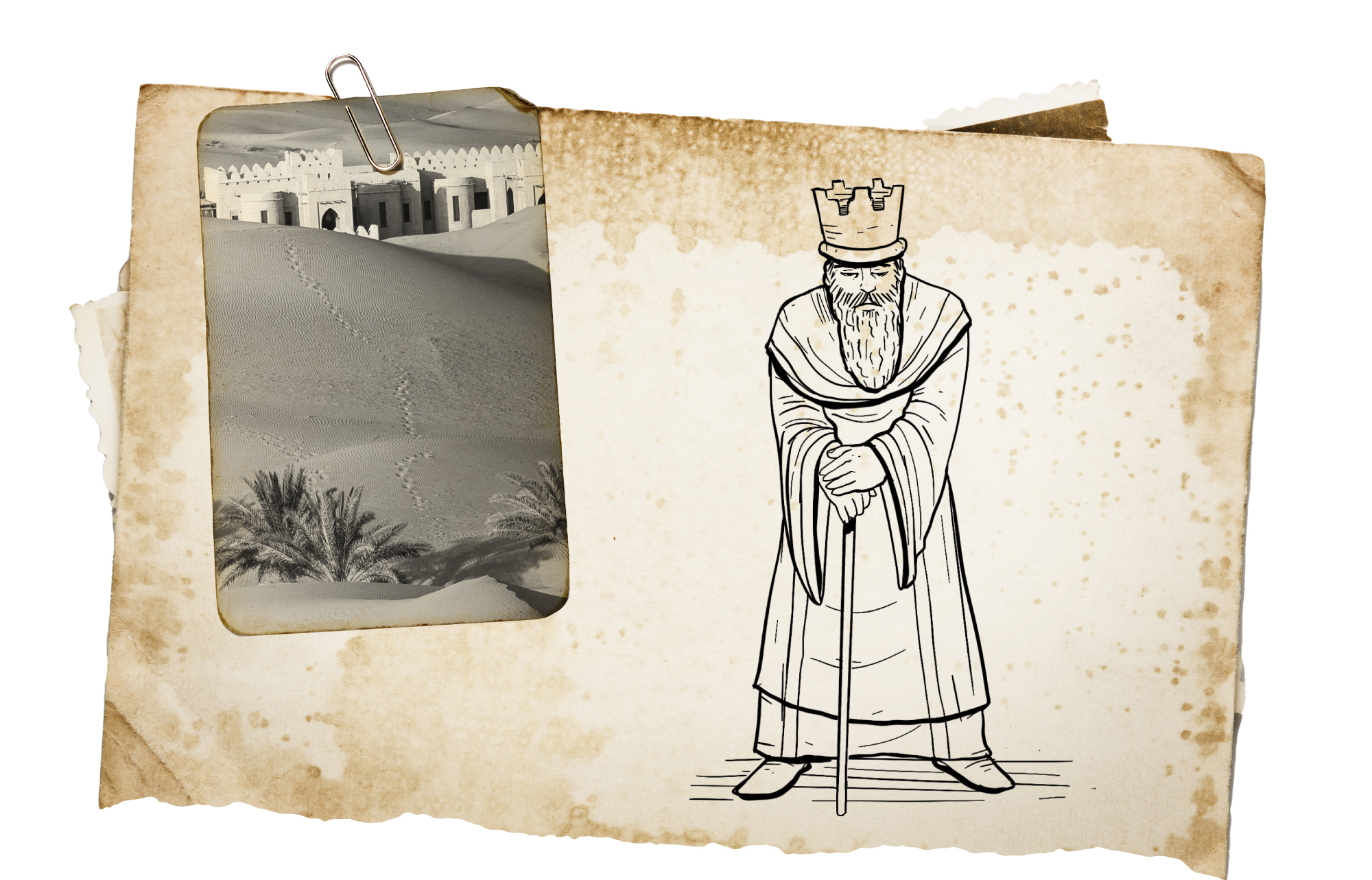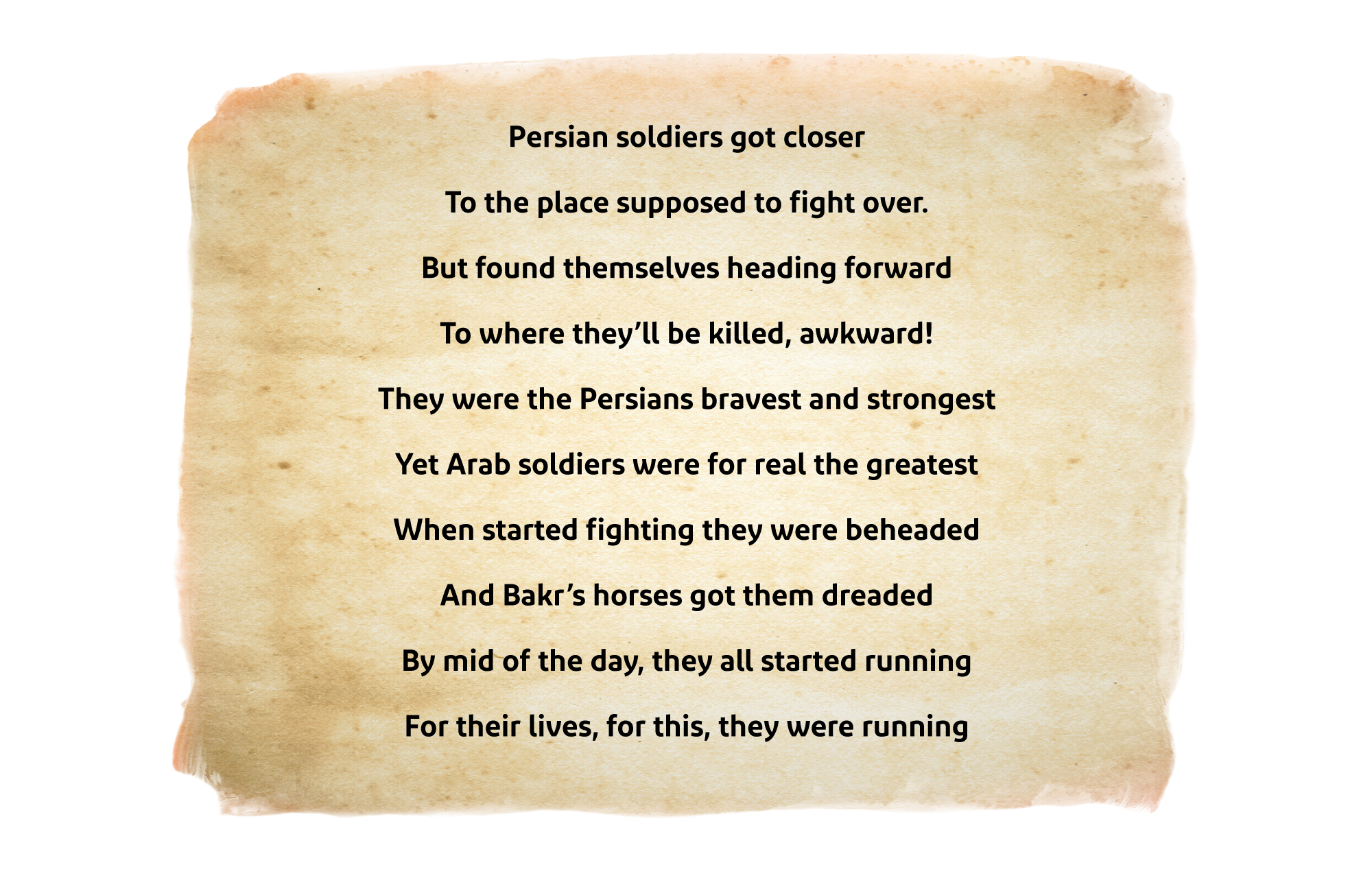
On a Day of Bravery and Dignity.
The Reverence of the Persian Khosrow Vanished under the Sands of the Arabian Desert
“Khosrow”, the Persian King, who was proud of his throne and Iwan would not have imagined that those Arabs coming from the middle of the desert could inflict a bitter defeat on him and his army. It was, rather, a historical disgrace that is still reverberated up to this day. Going back to that historical era to make a comparison between the Arab and Persian nations, we would find that the civilizational experiences and military capabilities of Arabs did not exceed the limits of their barren desert that neither had resources nor the minimum essentials of life. On the other hand, Persians lived with enormous resources due to their proximity to rivers and seas.
In a historical study prepared by Abdul- Manan Shafiq, titled “The Battle of Dhi Qar, a Historical Analytical Study”, in which he says about the reasons for the Arab victory in an unequal battle; when studying this battle, the reader feels confused when he knows that Bedouin Arabs were actually able to defeat the Sasanian state in this battle. He would also be astonished and stunned when he knows that Persia was the greatest state at that time as it has extended its dominant influence over a vast area of lands. It was in its very prime having power during the era of Khosrow Parviz who defeated the Byzantine state, achieved conquests on a large scale and called himself Parviz, which meant the Victorious one. On the contrary, Arabs were afraid of the Persian power at the time, so they were psychologically defeated, and they believed that they were inevitably vanquished. No better evidence to such state than the words of Hani bin Qabisa who, at first, suggested to his people to flee and save their skin in the desert. This also is proved by the wander of Al- Nu’aman bin Al-Mundhir about the Arabian tribes seeking for recourse, but no one accepted to support him. Tayy tribe even told him, were it not for your brother-in-law, we would have killed you. We are not willing to be hostile to Khosrow and we have no power against him. This shows that, on one hand, Arabs were psychologically defeated and were afraid of the brutality of Khosrow and his army. On the other hand, we find that there was a huge gap between the two sides regarding equipment and gear. In addition, there was a regular army against Irregular army. In spite of these harsh and inappropriate conditions, as well as the great contrast, the weaker side could achieve the magnificent victory and inflict an ignominious defeat on the Persians. This means that such victory neither came out of thin air nor was random. Rather, there was planning, reflection, reasons, and factors that led Arabs to victory and resulted in the defeat of Persians, the most important of which were two reasons:
1- The superior military planning and strategy implemented by Arabs before and during the battle, including: distributing the weapons of Al- Nu’aman bin Al-Mundhir, hastening to encounter the Persians, cutting the roads off, setting ambush against Persians, drawing water for half a month, incitement, encouragement, ideal leadership and other plans that helped Arabs very much to win the battle and defeat the Persians. In addition, there is no doubt that Persians also planned and set the necessary strategy, however, Arabs surpassed them in this regard in this battle.
2- Arabs fought this battle with unparalleled fortitude. They also fought desperately especially after they had known that, anyway, death was the fate awaiting for them because if they were left to flee to the desert, they would have died of hunger and thirst. On the other hand, if they surrendered to the Persians, they would have been killed while their women and children would have been taken captives. Thus, they were certain that death with dignity, bravery and honor in the battlefield is much better than death with humiliation, ignominy, degradation, and misguidance. Therefore, they joined their forces and defended themselves valiantly and won the battle.
In return, Persians were sure of victory over Arabs, but they were defeated because the battle was not a decisive fate for them. Thus, they neither exerted the effort that the Arabs exerted nor did they fight with fortitude. Therefore, they lost the battle.
“Dhi Qar” enhanced the status of Arabs and shook the Persian throne and influence. Rahaf Salam, researcher, gave a description in her published research on the impacts left by this war, saying, it made the borders of Sasanian state affiliated to Khosrow a target to the attack of the Arab tribes. Furthermore, such victory boosted the Arab morale and declined the Persian reverence in their eyes.
Khosrow Parviz did not accept the battle loss, so he burst with anger and immediately blamed someone else for the loss. It was no one but Iyas ibn Qabisa, Al- Hirah ruler, whom he promptly dismissed, as Persians considered him responsible for the defeat because he was the supreme commander of the army that fought the battle. However, Iyas escaped from him, as said by Arabs, as he separated from the battle when he realized the loss that his army had suffered. He went to Khosrow and deceitfully told him that Persians won that battle, fearing that Khosrow would dislocate his shoulder as he did before to the one who brought him bad news about it, then, he fled.
Iyas ibn Qabisa knew that he would be the first victim of the defeat incurred by Khosrow, therefore, he hurried to him before anyone saying, “We defeated Banu Bakr, and their allies, and we brought you their women”. Khosrow was pleased and ordered to give him a garment. Then, Iyas asked his permission to leave to visit his brother Qays ibn Qabisa whom he claimed was sick in Ayn Al- Tamr. Khosrow gave him the permission so he evaded capture. Then, a man from the people of Al- Hirah came to Khosrow while he was in Al- Khornaq Castle after he had known that Iyas preceded him to the king as he thought that Iyas told him of the Persian defeat. He entered to him and talked to him about the defeat, regression and capture of Persians. Khosrow ordered to immediately kill him. After that, Al- Hirah became directly ruled by the Persians after dismissing Iyas who deceived Khosrow.
Consequently, Persians directly ruled Al- Hirah and the Persian Azadhbih ibn Mahan was appointed as its ruler. However, he could not dominate the Persian influence whose status has been shaken after the defeat, neither could he restore the trust that once was between Al- Manathera and Khosrows, nor could he improve the relationship that has worsened between Arabs and Persians. Banu Bakr, who independently ruled Al- Bahrain, rebelled, then, they were followed by the tribes of the central Arabian Peninsula. This forced the Persians to return the rule of Al- Hirah to one of the sons of Al- Nu’aman, who was the arrogant Al-Mundhir, in an attempt to restore the pre- battle situation.
Persians were not able to regain their imperial reverence, they were given by Arabs, after Dhi Qar.

Khosrow could not restore the Persian reverence which they gained by their brutal ruling, their mastery of torturing, assaulting, and severely punishing their opponents. They even chased them to dislocate their shoulders. Such reverence vanished under the sand dunes and was blown away by the winds of the Arab bravery. Since poetry is the Arab Diwan (Arabic poetic literature) and their historical reference, Al- A’sha has proudly documented in his Mo’allaqa (one of the Hanging Odes) the results of that battle:



- Tawfiq Pro, The History of the Ancient Arabs ed. 2 (Beirut: Dar El- Fikr, 1996).
- Jawad Ali, Commentary on the History of the Arabs before Islam, ed. 4 (Beirut: Dar Al- Saqi, 2001).
- Khaled Al-Douri, The Arab Resistance to the Sasanian Influence in Al- Hira from 226 AD to the End of the battle of Dhi Qar, unpublished Master’s Thesis, College of Education, Tikrit University (2003).
- Abdul- Manan Shafiq, The Battle of Dhi Qar, a Historical Analytical Study (Mecca: Umm Al-Qura University, d.).
- Abdul- Wahhab Azzam, The links between the Arabs and the Persians and their Etiquette in the Pre- Islamic Era and Islam (Cairo: Hindawi Foundation, 2012).
- Raif Khoury, With the Arabs: In History and Legend (Cairo: Hindawi Foundation, 2019).
- Homa Katouzian, The Persians: Ancient, Mediaeval and Modern Iran, translated by: Ahmad Hasan Al- Ma’ini (Beirut: Dar Al- Jadawel, 2014).
